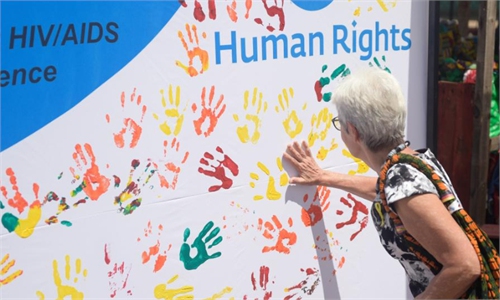China opposes politicization of human rights issues, hopes to have mutual progress through exchanges with EU

Miao Deyu, assistant minister of foreign affairs, meets with Paola Pampaloni, deputy managing director for Asia and the Pacific in the European External Action Service and EU delegation on June 17 in Beijing. Photo: Chinese Foreign Ministry
China opposes the politicization and double standards of human rights issues, opposes using human rights issues to interfere in China's internal affairs, and China hopes that it can achieve mutual progress through exchanges with the EU and make positive contributions to global human rights governance, said Miao Deyu, assistant minister of foreign affairs, while meeting with EU officials on Monday in Beijing.
Miao met with Paola Pampaloni, deputy managing director for Asia and the Pacific in the European External Action Service, who was in China for the 39th China-EU Human Rights Dialogue.
During the meeting, Miao provided a comprehensive briefing on China's human rights principles and achievements and emphasized that the Communist Party of China (CPC)’s fundamental purpose is serving the people wholeheartedly to realize, maintain, and develop the fundamental interests of the people.
China adheres to a people-centered approach, upholding that a happy life for the people is the greatest human right, and has developed a human rights path that aligns with the trends of the times and is suitable for its national conditions, achieving historic accomplishments in its human rights cause, Miao said, noting that China is promoting the great rejuvenation of the Chinese nation through Chinese-style modernization, which will further enhance human rights protection in China.
China actively participates in global human rights governance, advocating dialogue and cooperation, and contributing to the healthy development of international human rights, Miao said.
China opposes the politicization and double standards of human rights issues, rejects countries imposing own development model on others, opposes using human rights issues to interfere in China's internal affairs, and opposes confrontation and microphone diplomacy on multilateral platforms, Miao said.
China hopes that China and the EU can achieve mutual progress through exchanges and mutual learning and make positive contributions to global human rights governance, the official added.
The EU side said that the dialogue on human rights between China and the EU had enhanced their understanding and knowledge of China and they also expressed willingness to strengthen cooperation with China in multilateral human rights work.
The 39th China-EU Human Rights Dialogue was held in Southwest China’s Chongqing Municipality on Sunday and it was co-chaired by the Director-General of the Department of International Organizations and Conferences of the Foreign Ministry Shen Bo and Pampaloni.
During the dialogue, the Chinese side elaborated on China's human rights development path, its ideas about human rights, and achievements, as well as its positions and propositions on global human rights governance.
The Chinese side also lodged stern representations regarding the EU's recent release of the 2023 Annual Report on Human Rights and Democracy and the annual reports on Hong Kong and Macao, emphasizing that issues related to China’s Xinjiang, Xizang, Hong Kong, and judicial cases are purely China's internal affairs and should not be subject to external interference.
China demanded that the EU respect the facts and the Chinese people's independently chosen human rights development path and stop interfering in China's internal affairs under the pretext of human rights issues.
In response to the EU's unfounded accusations regarding judicial procedures, the death penalty, labor rights, ethnic and religious issues, China also firmly refuted and clarified the facts.
The Chinese side also pointed out serious human rights issues in EU countries, such as racial discrimination, infringement on immigrants' rights, restrictions on freedom of speech, religious hatred, judicial injustice, and violence against women, demanding that the EU take practical measures to address these issues.
Both sides agreed that the dialogue was candid and in-depth, contributing to mutual understanding and expressed willingness to explore cooperation in multilateral human rights areas concerning economic, social, and cultural rights, women, children, and persons with disabilities.
From June 13 to 17, the EU delegation went to the Xizang region, visiting projects related to local economic and social development, ethnic and religious affairs, education and culture, and human rights and legal protections. They also held discussions and exchanges with Chinese human rights experts and scholars in Beijing.
Global Times

